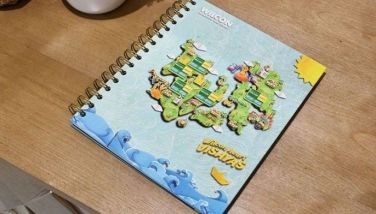Starting green habits at home
CEBU, Philippines - Okay, we’ve heard it said many times how our reckless ways are ruining the environment. Which means we are also ruining our world and ourselves. And so we try to compensate by swearing to do our share in reducing the negative things we’re causing on the environment and reducing our carbon footprints.
The effort to make the world greener is better started at home. The whole family shall be involved, especially the kids since they are the ones to inherit the world. Simple positive lifestyle changes can make a huge difference.
It can be as simple as encouraging family members to pay attention to the little things that they do and use around the house every day. By adopting green habits and shifting towards greener eco-friendly products, your children can help reduce carbon footprint, save energy and resource wastage, and reduce general negative impacts on the environment.
The website environmentalprofessionalsnetwork.com asks: Do you know what’s in the products under your kitchen sink, in the garage, in your bathroom, and on the shelves in your laundry room? The website encourages families to make sure they know what is in these products, about potential health effects, and about safety and handling.
Certain home products contain toxic ingredients that could put family members at risk. Thus, as much as possible only products that are free from toxic chemicals, ozone depleting elements and products that do not have ingredients that are harmful to humans or the environment shall be allowed for use at home.
The environmentalprofessionalsnetwork.com website also shares tips for parents to start the kids in green habits and make a shift towards sustainability:
Involve the kids in gardening. When you eat a cheeseburger, do you ever think of anything else other than how it tastes? If you trace the ingredients back to their origin, you will realize that your hamburger had to go through hundreds of miles of transportation, processing, and packaging before it reaches your plate. The whole process uses up plenty of energy, and produces plenty of green house gases.
The lettuce, tomatoes, onions, and other ingredients that accompany the beef in your hamburger also needed plenty of water and energy for irrigation, transportation, and storage. They were packaged and shipped to your local grocery store before you bought them. You could cut on the process by growing your own food in your backyard garden. You would reduce environmental impacts and also save on grocery bills.
Your children would easily connect with nature and learn to appreciate it more by growing plants. Instead of getting busy with electronic gadgets, the family might as well get together in a healthy activity.
Make healthy choices when eating. A few simple choices in food can have big impacts on the environment. You should know what you have in your refrigerator and freezer before you go grocery shopping. Buying food from your local farmers’ markets and buying fresh will reduce carbon emissions.
Even if you buy from your local grocery stores, you should know where the food originated from so that you know how many miles it traveled before being placed on the supermarket shelves. Buying seasonal and buying fresh improves the environment as well as your health. Cooking with your kids combines environmental benefits, nutrition, and affordability, all while having a great time.
Cooking with your kids and teaching them to cook will open up new dimensions in sustainability and your relationship with your kids. Let them prepare food for you and get them into healthy eating habits. When you cook more and eat out less, you will reduce food wastage, carbon footprints, and energy waste associated with food.
Practice recycling, reusing, and rebuilding. Kids today are being taught about recycling at school. They are becoming aware of the value of recycling from a very young age. Therefore, it is a lot easier to involve your kids in recycling household waste. You could recycle, reuse, and rebuild stuff around your house more easily, starting from your kitchen waste, which could be turned into organic compost and used for your backyard garden.
Rebuild any broken furniture, and recycle all metals, newspaper, glass, old clothes, electronics, and plastics. When kids outgrow toys or clothes, let them donate these items to local charities, if they are still in good shape. Having a yard sale or garage sale to get rid of the clutters at home can also be a good idea. You would be cleaning up your house while connecting with the neighbors and involving your kids.
Walk the talk or get your bikes out. Action speaks louder than words. Don’t just talk about sustainability but take action. Back in the day, people had to walk 5 miles in rain or shine to get to school, and the roads were winding and uphill both ways. The journey to school did not burn any fossils but it burned plenty of calories.
Kids today don’t seem to get enough exercise. If you live in the same neighborhood where your kids’ school is located, encourage them to walk or ride to school instead of driving them or riding the school bus. If you are afraid to let them ride alone, form ride groups to school. You may also get some exercise yourself by taking some time out and riding or walking with your kids when possible.
Use less energy and water. Most of the energy we use to power our homes, offices, and schools comes from burning fossil fuels. Using less energy would not only mean saving on energy bills, but also burning less fossils and reducing carbon and other greenhouse gas emissions. Get your family into the habit of using less energy and water.
Some electric appliances can draw energy even if they are turned off. Keep all appliances unplugged when not in use. Make sure to turn off lights and air conditioning when you leave the room.
Look for energy star ratings on your appliances, make sure that your homes are properly insulated and has no leaks. Fix that dripping water faucet, and any other leaking pipes. Take shorter showers and use water saving shower heads. Wash your clothes in cold water, use a smart energy saving thermostat, and replace your old appliances with latest energy saving ones.
All these ideas make sense. The world’s resources are becoming depleted, while the population has skyrocketed. The times call for habits to curb the degradation of the environment. And this is better started at home. (FREEMAN)
- Latest
































